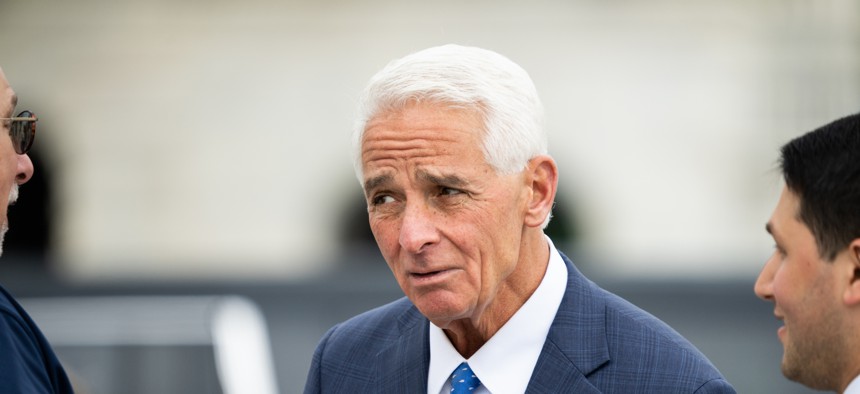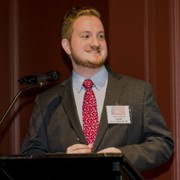Crist, Salazar rely heavily on remote voting while campaigning
Fried blasts Democratic primary rival for ‘abusing a Covid-era rule to campaign.’

U.S. Rep. Charlie Crist Bill Clark/CQ-Roll Call, Inc via Getty Images
Some of Florida’s representatives in Congress are embroiled in hotly contested elections that have them out hitting the campaign trail – which appear to be keeping them away from Capitol Hill.
Since the early days of the coronavirus pandemic, members of the U.S. House of Representatives have been authorized to cast votes through a designated proxy, a practice that just recently was extended into September. Originally meant to stem the spread of COVID-19 before vaccines were available, lawmakers have relied on other lawmakers to vote for them for various reasons (including using it while campaigning) and it has been used by members of both political parties – although somewhat more by Democrats on average.
In Florida’s delegation, not every member uses it equally, according to a City & State analysis of House of Representative Clerk’s Office vote tallies since May.
The analysis looked at the voting history of seven of the state’s most prominent House incumbents, whether they are embroiled in a tightly contested election, have high name recognition or both. Those seven were U.S. Reps. Matt Gaetz, Neal Dunn, Al Lawson, Val Demings, Charlie Crist, Byron Donalds and Maria Salazar.
Of the seven, Crist cast the highest number of votes by proxy, with 190 of his 278 votes – or more than two thirds – tallied without him having to physically be in Washington, D.C. Most of the votes he did cast in-person were in May, but he has largely relied on remote voting since then. Crist also voted by proxy 107 times between January and April, according to the Tampa Bay Times. Currently competing in the Democratic primary for Florida governor, he has spent the past several months actively campaigning across the state.
Chloe Kessock, Crist’s communications director, told City & State that proxy voting is a good tool to ensure the residents of his district continue to have their voices heard.
"The Congressman has two important missions: representing Florida's 13th District in Congress and giving Floridians exhausted by Ron DeSantis' never ending culture wars a clear choice in November,” Kessock said. “The proxy offers a great way to ensure his constituents' voices continue to be heard on legislation under consideration in Congress."
The campaign of state Agriculture Secretary Nikki Fried, Crist’s rival in the Democratic gubernatorial primary, sees it differently. Keith Edwards, Fried’s communications director, criticized Crist’s frequent use of proxy voting. Edwards also cited a 2009 report from the Tampa Bay Times that found Crist scheduled the equivalent of almost 10 weeks off annually.
“Charlie was elected to go to D.C. and represent the people of Florida, instead he’s abusing a Covid-era rule to campaign,” Edwards said. “But when he actually does campaign, he either shows up late, leaves early, or cancels. This all begs the question: what does Charlie Crist actually do?”
Crist isn’t the only representative in a competitive race that frequently relied on proxy voting in Congress. U.S. Rep. Maria Salazar cast 120 votes by proxy in the same time frame, or about 43% of her votes cast. She is in a swing district that is one of the most vulnerable to be flipped in 2022, with Democratic frontrunner Annette Taddeo her most likely challenger in November.
However, not all Florida representatives in tough races used proxy voting frequently. U.S. Rep. Val Demings used it 31 times, or for about 11% of all her votes. Demings, a Democrat who is challenging U.S. Sen. Marco Rubio, has criticized the Republican incumbent for his attendance record in the Senate, which doesn’t allow proxy voting. Since taking office in 2011, Rubio has missed more than 9% of his votes, according to GovTrack, one of the highest rates for all Senate members.
Another legislator in a tight race scaled back his use of proxy voting in the months after it was reported that he was the single most frequent user of it in the U.S. House.
Since May, U.S. Rep. Al Lawson used vote-by-proxy 104 times, or for 37.4% of all votes. An Insider analysis from earlier this year found that Lawson used it on a whopping 96.5% of votes from May 2020 to April 2022.
Due to redistricting, Lawson is defending his seat in Congress against Rep. Neal Dunn, the only incumbent-vs.-incumbent congressional race in the state. Dunn voted by proxy significantly less than Lawson, relying on it for 61 votes.
By contrast, U.S. Rep. Byron Donalds voted by proxy just 13 times since May, or about 4.6% of the time. The only Black Florida legislator in Congress, has said he is considering a run to be chair of the House Republican Conference. He has also been a fundraising dynamo, with his reelection campaign account bringing in $3.78 million without a difficult challenger in his safely red district.
Similarly, U.S. Rep. Matt Gaetz used proxy voting 27 times, or for 9.7% of his votes. Yet Gaetz has been a rare Republican to enthusiastically support the practice, arguing that it should be adopted permanently via electronic voting.
“(Legislators would) spend more time in their districts and accountable to their people,” Gaetz told Forbes in March 2021, “and less time in the Washington swamp.”
